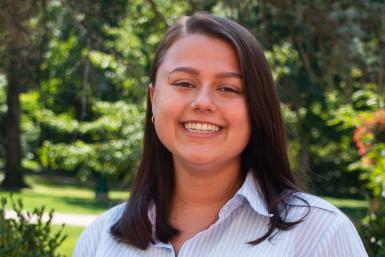Reporters Without Borders chapter celebrates Student Press Freedom Day
Reporters Without Borders at IU is raising money for The Optimist, Bloomington High School South’s student newspaper, in honor of Student Press Freedom Day this year.
Student Press Freedom Day, Feb. 24, is an annual event by the Student Press Law Center to spread awareness and give support to student journalists.
This year’s theme, “Unmute Yourself,” focuses on combating self-censorship among student journalists. Self-censorship is when journalists choose not to pursue a story because they are concerned about legal or administrative repercussions.
Alex Hardgrave, the president of Reporters Without Borders at IU, said the group advocates and educates people about press freedom and different press issues, and that their fundraiser is a good way to meet the SPLC’s goal of promoting student press freedom.
The group set up a GoFundMe to raise money for The Optimist because high school newspapers are an important part of student journalism, Hardgrave said.

“Starting on their high school newspapers and yearbooks is where a lot of students get introduced to the press and how they can use their voice,” Hardgrave said.
Hardgrave said that self-censorship can be a big issue at high school newspapers, so RWB-IU’s fundraiser also fits this year’s theme of bringing awareness to self-censorship.
“SPLC wants you to realize that you may have self-censored without even realizing it and that’s how important stories like sexual assault, racism, COVID policies, school finances and hard topics like that go unreported,” Hardgrave said.
Rosalind Bowling, vice president of RWB-IU, said many people have the perception that student journalism isn’t real journalism and that it doesn’t face the same hardships as other forms of journalism.
However, Bowling said that many student papers have broken important stories, such as Manual RedEye, the student paper from duPont Manual High School in Louisville, which last year broke a story that Kentucky state police used Nazi symbols and Hitler references in their training materials.
“So of course student newsrooms are doing a lot of the heavy lifting of journalism despite the fact that they’re still students and maybe even in high school,” Bowling said.
Bowling said that people might be more willing to limit student press freedom because they think students shouldn’t be covering hard topics.
“They think ‘Why can’t we just have light and fun student news?’” Bowling said. “And that’s just not necessarily the world we live in.”
Both Hardgrave and Bowling encouraged student journalists to use the SPLC’s resources to know their rights when reporting important stories.
RWB-IU will have a table in the Franklin Hall commons from 11 a.m. to 4 p.m. on Feb. 24 to promote Student Press Freedom Day.

